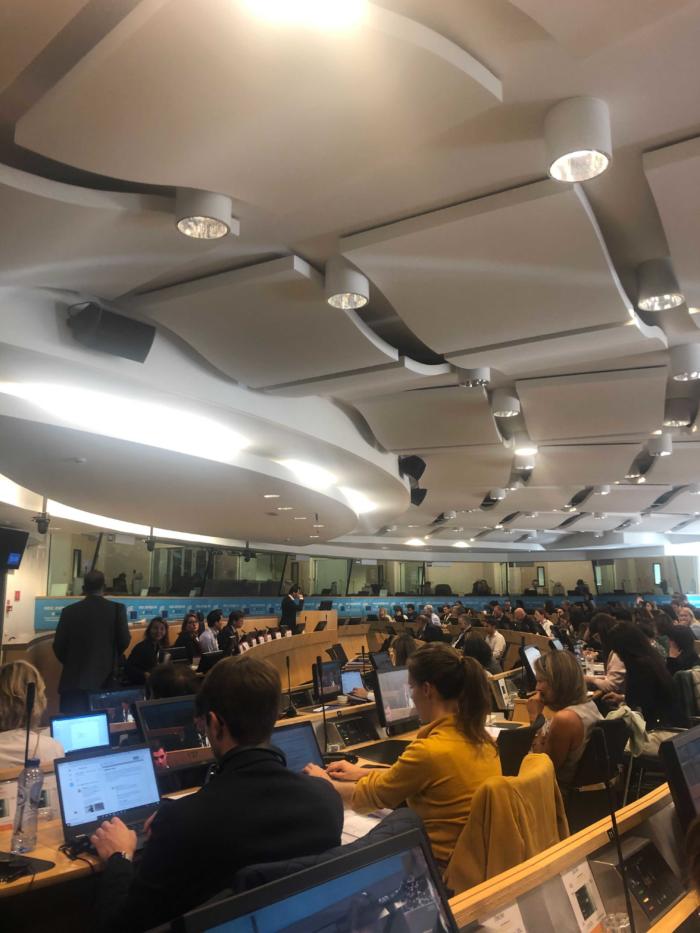Sport as a tool for the inclusion of young migrants must be squarely put on the EU agenda
On Thursday 20th and Friday 21st October 2022, Sport and Citizenship had the honour of participating in the 7th European Forum on Migration (EMF). Organised every year by the European Commission and the European Economic and Social Committee, the EMF is a platform for dialogue between civil society and European institutions on issues related to migration, asylum, and migrant integration.
 The topic of this year’s EMF was “Youth inclusion: key to successful migrant integration”. In this respect, Sport and Citizenship was willing to listen to our fellow participants. Our think tank also had much to contribute: in line with our work on the social impact of sport, we advocate for a better recognition and use of sport as a tool for the inclusion of refugee and migrant populations.
The topic of this year’s EMF was “Youth inclusion: key to successful migrant integration”. In this respect, Sport and Citizenship was willing to listen to our fellow participants. Our think tank also had much to contribute: in line with our work on the social impact of sport, we advocate for a better recognition and use of sport as a tool for the inclusion of refugee and migrant populations.
These two days were rich in contributions. Discussions particularly focused on how to make spaces more inclusive. A strong emphasis was also put on advancing participation and engagement of young migrants. Despite some up-to-date exchanges and a short testimony by Mahdiyah Ayub on this matter at the opening of the forum, Sport and Citizenship strongly regrets the absence of the theme of sport as a tool for social inclusion of young migrants and refugees in their host community.
This was particularly disappointing when we acknowledge that the topic of measures regarding integration of young refugees was on the agenda. This came even more as a surprise when we know that the European Commission yet recognises that sport can be an efficient tool to facilitate a successful integration of refugees; and that local sports have an increasing role in facilitating refugees’ integration. Commissioner Johansson reminded us that integration does not mean integrating into a country, but rather integrating into a community, which we fully agree with. However, the community must be supported and given all the means to succeed in this integration – or rather inclusion.
Can we talk about a successful social inclusion if leisure, and especially sport activities, are side-lined? No. Beyond physical activity as such, which is crucial for health, sport is a powerful lever for social inclusion in the host community. For young refugees, sport is a way to connect with new people, to make “new friends”, to learn in a latent way the local language and the social codes of the host community. Joining a sports club with other young locals allows a young migrant to become part of a group and to feel worthwhile, both in his/her own eyes and in the eyes of others. The list of benefits for locals and newcomers alike is long. Sport is certainly not the paramount solution for the social inclusion of young migrants, but it is an ideal springboard and remains an under-valued lever.
Therefore, sport as a tool for the inclusion of young migrants must be squarely put on the EU agenda. The space offered by the EMF can, and must, a space of exchange on sport as a tool for social inclusion, to give the floor to theoretical and field experts who will accompany civil society actors in the use of this powerful lever for inclusion. An idea would also be to allow relevant stakeholders in the topic, which are numerous in Europe, to connect before in a kind of online group, to provide concrete topics for discussion related to sport at the forum. Bringing together the voices of stakeholders involved in the field of sport as a tool for social inclusion in Europe is a strong commitment of Sport and Citizenship. We will continue to strengthen our advocacy for a better recognition of the use of sport as a tool for social inclusion for young refugees and migrants towards the European institutions.
More information about this subject with our EU project FIRE+ (Football Including Refugees) :
Our website about FIRE+ : www.footballwithrefugees.eu/
Our project page : www.sportetcitoyennete.com/en/projet-fire










 MEMBERSHIP
MEMBERSHIP CONTACT
CONTACT FACEBOOK
FACEBOOK